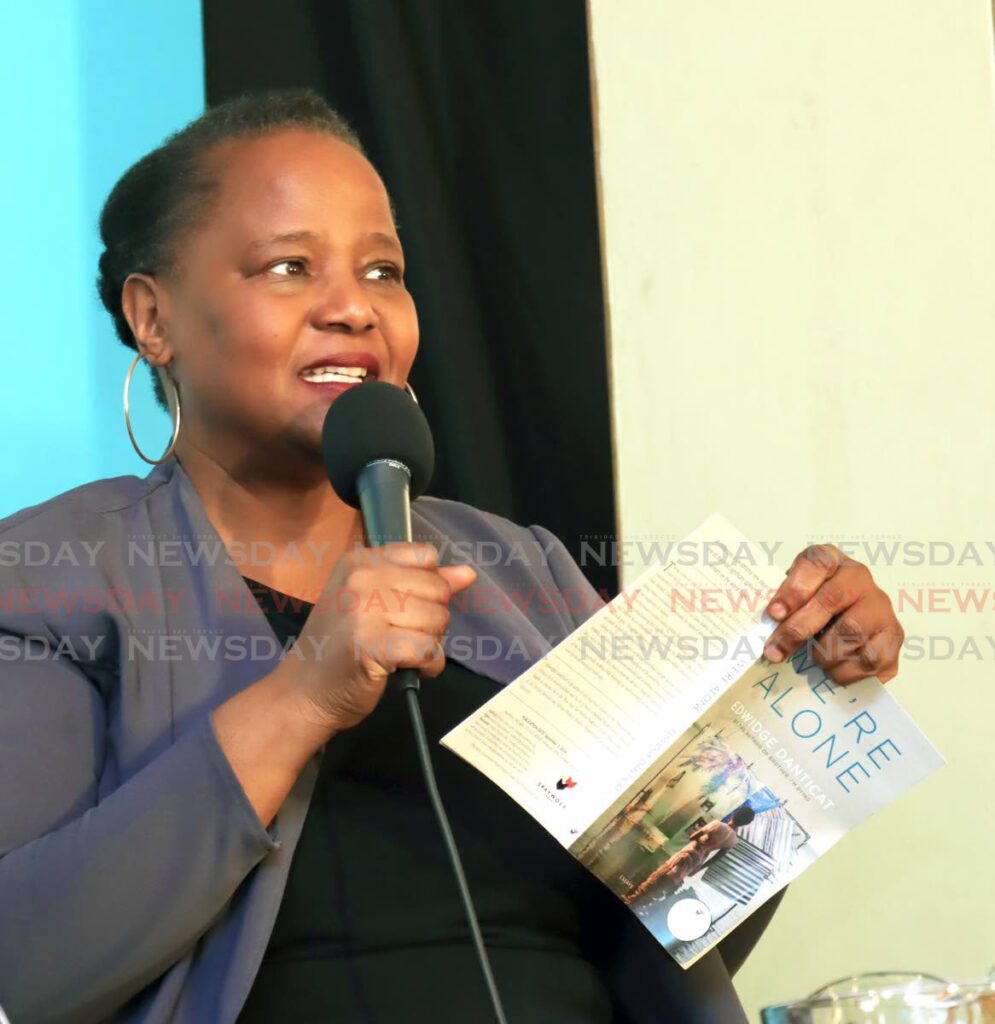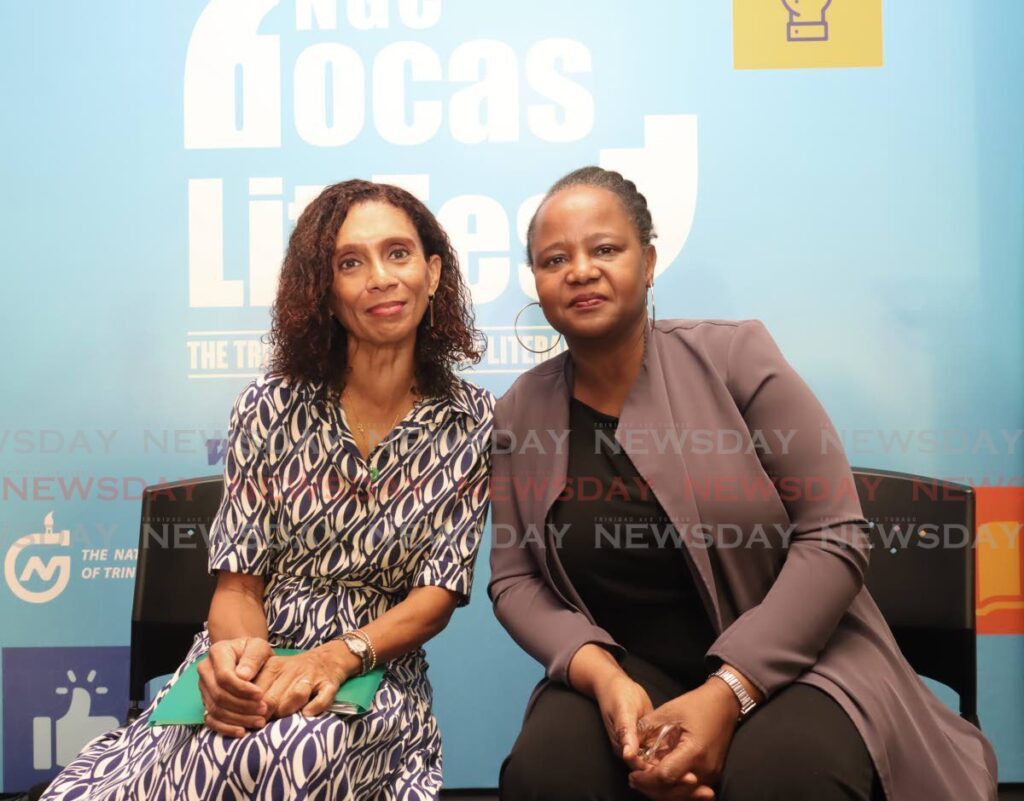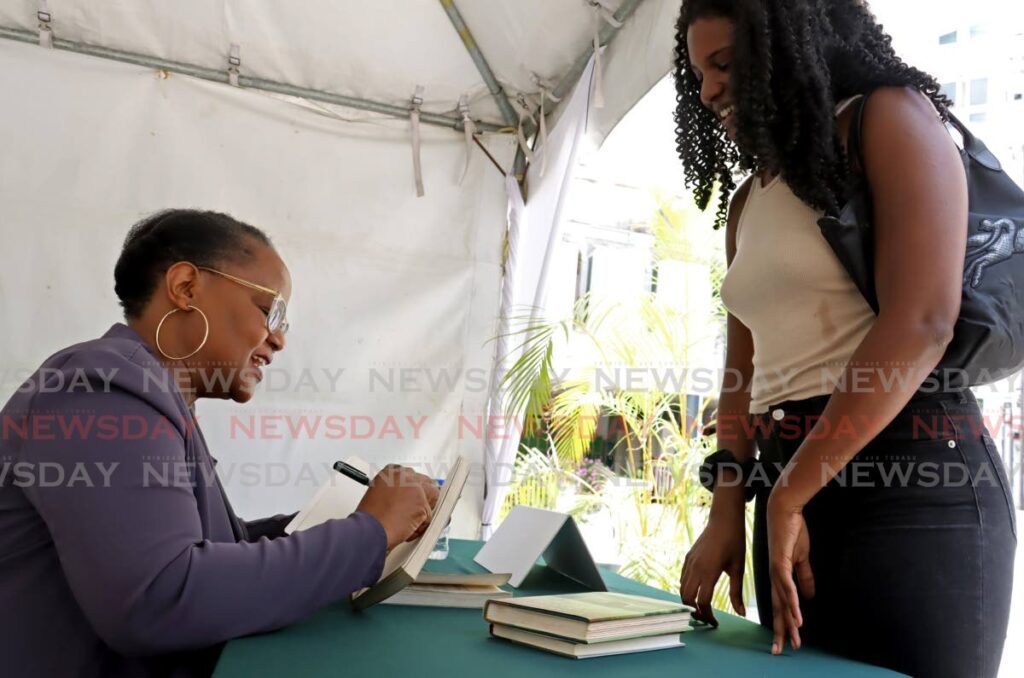Edwidge Danticat reconnects to Haiti through her books

Acclaimed Haitian-American author Edwidge Danticat was the subject of much adulation at the 2024 NGC Bocas Literary Festival, held at the National Library from April 25-28. Danticat spoke with author Elizabeth Walcott-Hackshaw about the roots of her work.
Born in Port-au-Prince, Haiti in 1969, Danticat moved to New York when she was 12. Her parents, Andre and Rose, had migrated, and she, along with younger brother Andre, remained in Haiti and were raised by her aunt and uncle until they joined their parents.
Danticat grew up in a family of oral storytellers, and she recalled the first time she fell in love with the written word.
“I would watch them and take this in, but I was a shy kid, so I knew this was never going to be me, I was never going to be that auntie singing and so on. I remember when my uncle gave me a book and I held it. I went to a corner with it and I thought 'we’re alone,' me and this book, this person."

She wrote her first book Breath, Eyes, Memory at age 25, and has since written 17 books, both fiction and non-fiction, including eight for young adults.
Although Danticat is US-based, her books are set in Haiti. She said she uses a variety of techniques to envision the land of her birth.
“I have to be able to walk the streets, I have to be able to smell the air, I have to be able to hear the roosters. I have to be able to immerse myself. Sometimes its from memories, sometimes it’s from going back. The most vivid image of that is when I was writing Claire of the Sea Light, we were in the south of Haiti in the summer and it was so helpful to see it.
“I think you return to the place that you don’t live, that you love, that you have family. My family is like 'don’t write about us, don’t write about this,' and I can’t write in the moment, but I’m absorbing. I count on my memory to help me to write.”
She said when she was growing up it was expensive to return to Haiti, so she read a lot of Haitian writers in order to immerse herself in the landscape.
After graduating from Clara Barton High School in Brooklyn, New York, Danticat entered Barnard College in New York City where she graduated Phi Beta Kappa in 1990. Initially she had intended to become a nurse, but her love of writing won and she received a BA in French literature. She graduated with an MFA in creative writing from Brown University in 1993.
Walcott-Hackshaw said Danticat’s work showcased themes of migration, memory, loss and return in Breath Eyes Memory, Dew Breaker, and Sunrise Sunset, and asked if these had changed as she got older. Danticat said many things have changed over the years since she began writing.
“Both of my parents have passed away, I have two grown children, I’ve moved to different places. All of that experience layers and adds nuance to one’s life, but also to the writing. I think in that whole journey, what I’ve learned most is to be patient with myself. I’m the most critical of my own writing and I can always see a hole in many things."
Danticat is married to Fedo Boyer and has two daughters, Mira and Leila.
“As time goes by and people pass away and you see children being born, you realise, 'yes I’m a writer, it’s part of my life, but it’s not my whole life,' and that’s helped a lot. I know everything that happens to me will in some way filter through my writing, but I don’t have to seek love or friendship through my writing. The idea that you have this other vibrant, sometimes messy personal life parallel to this, was very crucial to me as a human and as a writer.”

Danticat said she uses her writing to answer questions about life. She said writing is also how she practises self-care and processes her emotions.
“For me writing is a way of processing grief, of processing losses, it’s a celebration as well."
Her book The Art of Death talks about how other writers have dealt with the topic of death. She said when she was working on it and people asked about it, the conversation could last from five minutes to five hours, depending on the person’s comfort level.
“I was separated from my mom for about eight years. At the end of her life she came to visit and I took her to a friend who’s a doctor and it turned out she had stage four ovarian cancer, so she never returned to New York and we spent the last few months of her life together. It was so healing for us.
“I was really amazed by the fact I could sit at her side and send email and live my life, and my kids were around when we brought her home. After that 18 months I felt like we had healed and there was nothing left unsaid.
“She was always like, 'never write about me,' because people think the mothers I’ve written about are her. And then when she passed, I said part of writing is breaking promises to the dead. I couldn’t write about anything else, though, before I wrote about her.”
Danticat said she looked forward to working on the book, Brother I'm Dying, because it let her visit with her father and her uncle who had raised her. They both died recently, in the same year.
“I really wanted to go to those pages because I could see them, I could recreate their stories, it was a way of being with them.
“It’s a memoir about the year my father died, my uncle died, and my daughter Mira, who’s now 19, was born. It was a whole cycle that happened within nine months. That changed me a lot, because initially it started when my uncle died in US immigration custody in Miami, and they gave us his briefcase. In his briefcase he had started writing a book, and he’d always wanted to write a book. So one of the first things I wrote is, 'I’m writing this because they can’t.'”
She said it was interwoven with the history of Haiti as her uncle had been involved in local politics in Port-au-Prince at a community level.
“I was writing this book and thought if I only had one book it would be this one, as I could pass it on to my daughter who was about to be born. There’s this whole generation of our family who some of them have never been to Haiti, and it tells the story of our family.”
Danticat said at the time she had been interviewed by 60 Minutes and appeared before the US Congress, so she felt it was a political tool and also a beautiful book.
“I put all the craft I’d learned into that book.”
Asked about her writing process, Danticat said she starts with a line or scene, gives herself something to write towards that might or might not be the end, and works toward a first draft.
“I’m a bit of a obsessive binge writer because I always have this fear that I’ll be hit by a bus before I finish my draft, and so I must finish before that bus catches up, so I just try to get through it.
“I haven’t had a routine since my children were born. My routine is around their lives. My routine used to be, when I was doing the school run, around that. So drop off, go home and write until it’s time to pick up. I always tell writers to write around the life you have. So don’t wait until you retire or until you have more time, just build around the life you have.”
Danticat is the Wun Tsun Tam Mellon Professor of the Humanities in the department of African American and African Diaspora Studies at Columbia University.


Comments
"Edwidge Danticat reconnects to Haiti through her books"